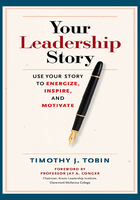
Introducing Bob
But first, let's introduce the subject of our running case study, Bob. Bob works in a large service organization, and he's had several such jobs utilizing his expertise in other firms. Bob is an innovative thinker, a creative person, who, when left to his space, comes up with great ideas. But as I indicated in the introduction, he wants to determine whether he should continue as he is in his profession or take on more duties. Is he ready to be a leader? His anxiety stems from a true dilemma: this … or that, and is he taking on too much?
"Tim, I've had a great run in my profession. I've worked for many companies. Each gave me wide latitude to create new stuff, and I like that. But I am jumping around a lot. Five employers in the last 15 years. It's taking a toll on my family."
"Why did you leave each company, Bob?" I asked him.
"Well, others were being tapped for bigger projects, so I figured it was time to move on. What's more, each new company was in a different market space, and it seemed like a good way to learn."
"OK, but what I am hearing is this: you want to settle down a little, on the personal level, so what do you want to give up?"
"I guess I have to give up the thrill of my own pet projects and become a team leader. But recently a bunch of my peers and I took a leisurely Friday lunch after I announced that I was leaving the company. Conversation started with questions about the new job and then drifted to projects and promotions at my current firm. I started talking about my projects. "You guys are taking on bigger projects with more admin stuff, but I am off to learn a new business."
"Stop right there, Bob. How did your lunch mates react to that statement?" I asked.
"Well, I asked why they were doing that, giving up their own autonomy and all. But I guess the implication of my question just plopped down right on the table and kind of sat there: why not me? An uneasy silence came over the group. They started, you know, checking their iPhones and fidgeting."
"After the dead air, did anyone say anything more?" I asked.
"One guy smiled kind of weakly and said something about the value of larger teams, something like running a big team develops more winners and innovators, and most companies want that. He added, 'But it takes people who can lead. It's one thing to be a technocrat or expert in your profession, but it's a bigger thing to become a leader of other experts.' Then he said something I have never heard of or thought of before. He said, 'Bob, you have to develop a new profession—leadership. Not just project management. Not just managing a couple of people. Strategic leadership.'
"And then another guy at the table said it more emphatically. He told me that I needed to go after and begin leading big teams where I would set the vision, motivate and develop the team members—and deliver big results. He said that for big companies, it's pure economics, like the multiplier effect."
"How did that one hit you, Bob?" I asked.
"Well, the third guy piped up. I could tell he was real uncomfortable, you know, scrunching up his mouth. He said I had the reputation of being a lone ranger, a control freak. The others smiled uneasily at that one. Wow. I had no idea I was perceived that way. I was shocked. It was quite an awakening, like the mirror just got refocused right in front of me."
"So did that casual lunch become a turning point for you?"
"It surely did. Tim, I am realizing something I hadn't thought about before. Expertise is one profession, but eventually you have to apply your individual expertise to the leadership of others—teams, sometimes big teams—to become really, really valuable. I have to stop being a lone ranger. I've got to learn how to lead strategic teams. By being a better leader myself, I will have the potential to get greater results and to have a greater impact on others. That can be a lot of pressure. But I am not sure I can rise to that level of responsibility. Can I become that big a leader? Do I have the right stuff—or should I stick with the path I am on? Can you walk me through your process?"
We will visit with Bob as we walk him, and you, the reader, through each step. It may not be a completely sunny walk, but you will be grateful for the exercise.